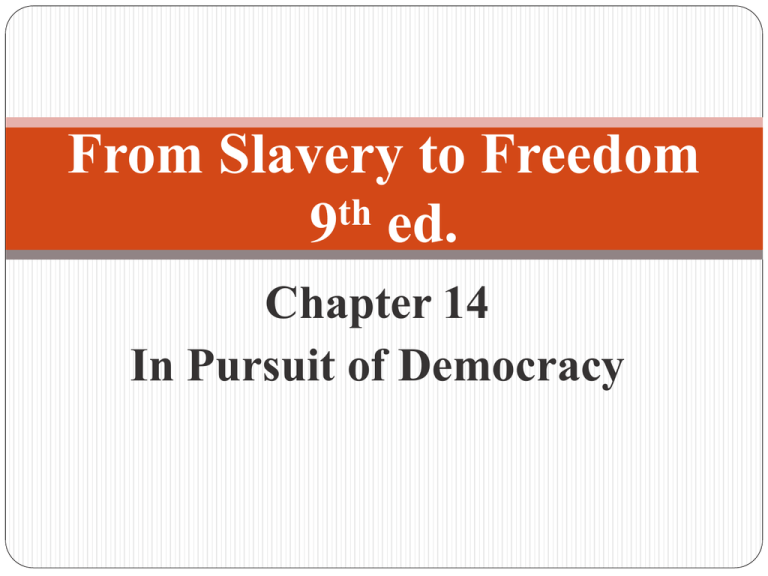
From Slavery to Freedom
th
9 ed.
Chapter 14
In Pursuit of Democracy
Answering the Call to Fight
The Selective Service Act
U.S. entered World War I in April 1917
Selective Service Act passed in May 1917 with
no racial restrictions
African Americans disproportionately represented
in draft
Fewer blacks received exemptions based on marriage,
children
Racism in armed forces undeniable
Black men rejected for officer’s commissions
2
© 2010 The McGraw-Hill Companies, Inc. All Rights Reserved.
Answering the Call to Fight
The NAACP
Responded to “whites-only” policy in the Army’s
officer training camps
Became part of organization’s civil rights agenda
Pushed for establishment of black officers’
training camp
Some critical of push for Jim Crow training camps
Blacks eventually commissioned starting in
Des Moines, Iowa, in October 1917
3
© 2010 The McGraw-Hill Companies, Inc. All Rights Reserved.
Answering the Call to Fight
Emmett J. Scott
Appointed special assistant to Secretary of War;
charged with giving advice on matters relating to
African Americans in the war
Urged equal and impartial application of the Selective
Service Act
Formulated plans to raise black soldiers’ morale
4
© 2010 The McGraw-Hill Companies, Inc. All Rights Reserved.
Jim Crow Military Camps
Locating Training Camps
Training of black soldiers in domestic camps
problematic because white communities did not
want a large number of black men in their midst
Rampant Discrimination
Black troops faced discrimination from the Army
and the civil agencies that served it
Also faced hostility from white civilians
5
© 2010 The McGraw-Hill Companies, Inc. All Rights Reserved.
Jim Crow Military Camps
African Americans Fight Back
Response to riot in Houston in August 1917
enraged African Americans and shook their faith
in their government
Black Fifteenth New York Infantry mistreated
while in training in Spartanburg, South Carolina
Prevented from retaliating; eventually sent to Europe,
becoming the first contingent of African American
troops to reach the Western Front
6
© 2010 The McGraw-Hill Companies, Inc. All Rights Reserved.
Service Overseas
The 369th
African American troops among first combat
forces to go overseas
From July1918 on, the 369th saw almost
continuous action against the enemy
The 369th first and longest serving regiment
assigned to support a foreign army
Other African American Combat Units
370th, 371st, 372nd United States infantries all
fought valiantly
7
© 2010 The McGraw-Hill Companies, Inc. All Rights Reserved.
Black American “Buffalo” soldiers of the
367th infantry, 77th Division, in France
8
© 2010 The McGraw-Hill Companies, Inc. All Rights Reserved.
Decoration of African American Soldiers
9
© 2010 The McGraw-Hill Companies, Inc. All Rights Reserved.
Service Overseas
German Propaganda
Leafleted black troops of the Ninety-Second
Division urging them to desert U.S. Army,
promising liberty, democracy, equality
Slander Campaigns
Black troops severely criticized if suffered defeat
Became brunt of slander campaigns
Cultural Experiences
Most combat units had their own band
10
© 2010 The McGraw-Hill Companies, Inc. All Rights Reserved.
Lt. James Reese Europe
11
© 2010 The McGraw-Hill Companies, Inc. All Rights Reserved.
Women’s war work
12
© 2010 The McGraw-Hill Companies, Inc. All Rights Reserved.
Service Overseas
YMCA and YWCA in France provided services
for black soldiers’ comfort
Had better opportunities to move about and
socialize in France than in the U.S.
Coming Home
Some whites worried that habits developed in
France would be detrimental to interracial
stability when black troops returned home
All troops enthusiastically received upon return
13
© 2010 The McGraw-Hill Companies, Inc. All Rights Reserved.
Service Overseas
Wilson’s Contradictory Positions
No African colony, including Germany’s
colonies, received independence after war
Wilson criticized by Du Bois
“Has the world forgotten Congo?”
In light of continued colonialism, peace rhetoric
angered many African American leaders
Encounter of African Americans, Caribbeans,
and Africans during war fostered dialogue of
common oppression and racial destiny
Pan African Congress held in February 1919
14
© 2010 The McGraw-Hill Companies, Inc. All Rights Reserved.
On the Home Front
African Americans Support the War
Blacks joined domestic war effort
War bonds; production and conservation of food
Curtailing Civil Liberties
Patriotic fervor led to curtailment of civil
liberties and stifling of dissent
Silencing Dissent
Racism conflated with nationalistic zeal and
wartime intolerance
Black protest believed to be work of outside saboteurs
15
© 2010 The McGraw-Hill Companies, Inc. All Rights Reserved.
On the Home Front
Many hesitated to articulate nonconformist ideas
Those who opposed war came under attack
At same time, black press came into its own
Encouraged blacks to move to industrial centers to
find work; protested racist incidents; led fight for
integration
Black Exodus
Thousands of African Americans moved from
South into northern cities
Both economic reasons and social considerations
played role in exodus
16
© 2010 The McGraw-Hill Companies, Inc. All Rights Reserved.
On the Home Front
New Opportunities
Migration gave blacks new opportunities in
industrial employment
The National Urban League
Helped newly arrived blacks adjust to life in
northern industrial cities
Employment in Industry
African Americans organized several unions
In 1917, AFL encouraged workers of all colors to
present a common front to industry
17
© 2010 The McGraw-Hill Companies, Inc. All Rights Reserved.
New Jobs for
Women
18
© 2010 The McGraw-Hill Companies, Inc. All Rights Reserved.
On the Home Front
Riots and Lynchings
Outbreaks of racial injustice damaged morale
that was briefly buoyed by stories of black
wartime valor
Fifty-eight African Americans lost their lives to
lynchings in 1918
Racial clashes in both North and South continued
19
© 2010 The McGraw-Hill Companies, Inc. All Rights Reserved.






